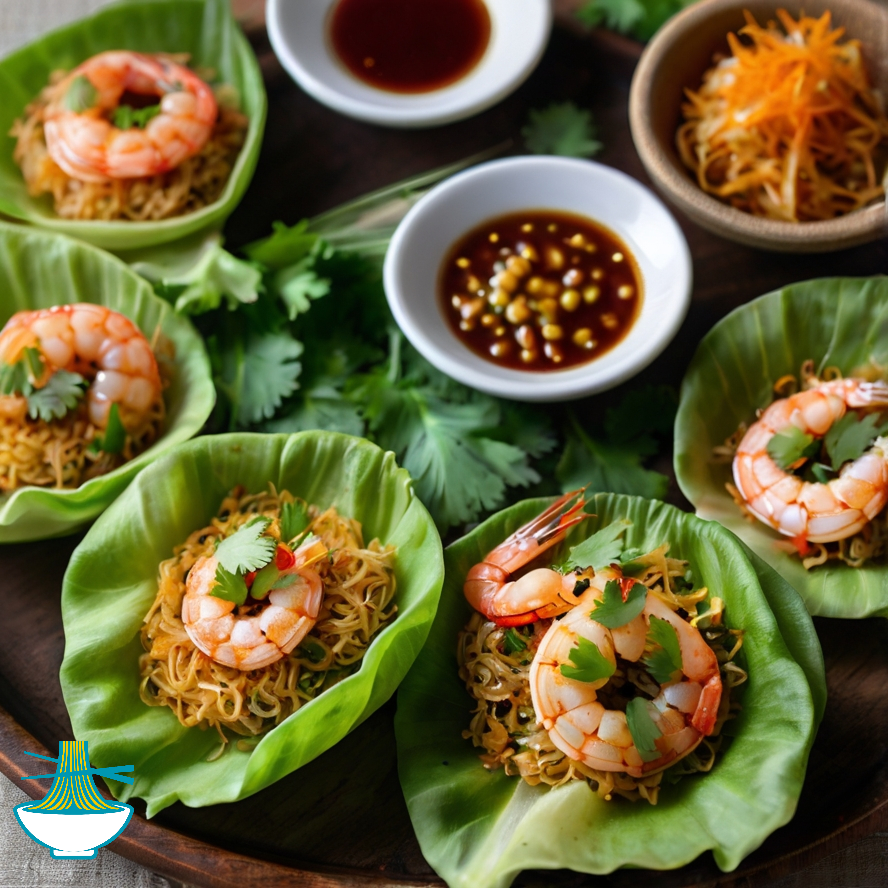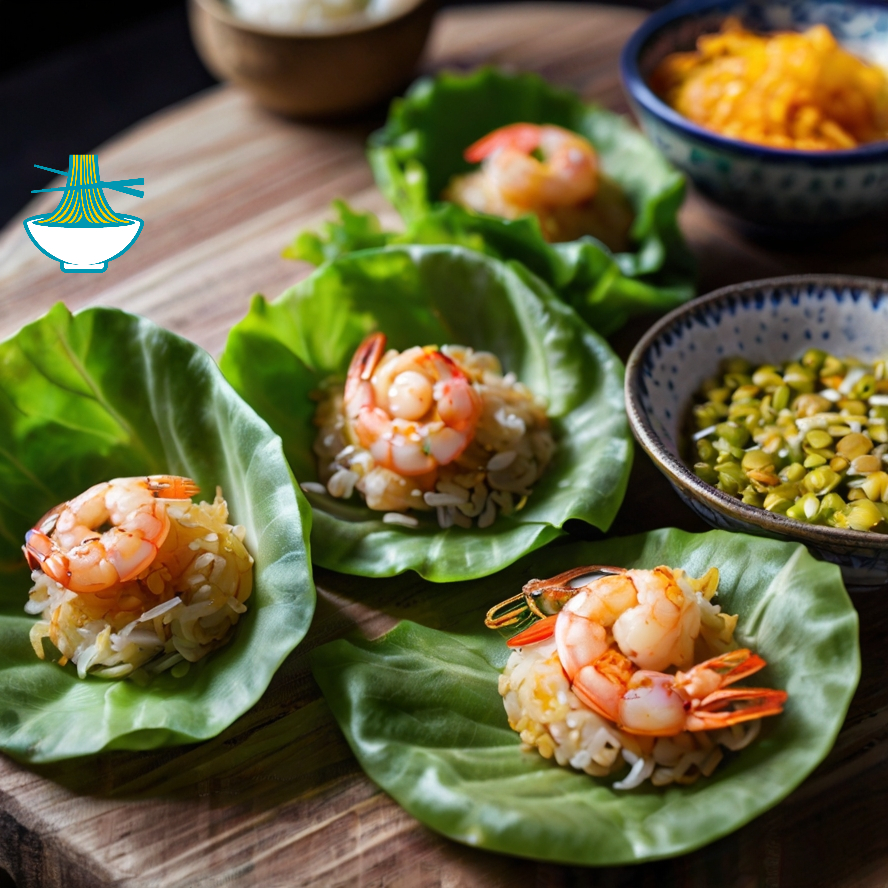Banh Khot is a Vietnamese delicacy consisting of mini crispy rice pancakes topped with succulent shrimp, aromatic herbs like cilantro and mint, and crunchy mung beans. These pancakes are cooked until golden and served with fresh lettuce wraps, creating a delightful contrast of textures and flavors.
The history of Banh Khot dates back to Vietnamese culinary traditions, particularly in the southern regions where rice-based dishes are prevalent. It is believed that Banh Khot originated as a variation of Banh Xeo, another famous Vietnamese dish featuring crispy rice crepes filled with savory ingredients. Over time, Banh Khot has become a beloved street food and a popular item in Vietnamese restaurants worldwide, cherished for its crispy exterior and savory fillings that showcase the richness of Vietnamese cuisine.
Ingredients:
- 1 cup rice flour
- 1/4 cup cornstarch
- 1/2 teaspoon turmeric powder
- 1/2 teaspoon salt
- 1 cup coconut milk
- 1/2 cup water
- 1/2 pound small shrimp, peeled and deveined
- 1/2 cup mung beans, sprouted
- Fresh herbs (cilantro, mint), chopped
- Vegetable oil for frying
- Lettuce leaves for serving
Method of Preparation:
1. In a mixing bowl, combine rice flour, cornstarch, turmeric powder, and salt.
2. Gradually whisk in coconut milk and water until you have a smooth batter.
3. Heat a non-stick Banh Khot pan or a small frying pan over medium heat. Brush with oil.
4. Place a few shrimp and a sprinkle of mung beans into each mold of the Banh Khot pan.
5. Pour batter into each mold to cover the shrimp and beans. Cook until the edges are crispy and golden.
6. Carefully remove the Banh Khot from the mold using a spoon.
7. Serve Banh Khot hot with fresh chopped herbs and lettuce leaves for wrapping.
Nutrition Value:
1. 1 cup rice flour:
- Calories: Approximately 578 kcal
- Carbohydrates: About 128 grams
- Protein: Around 7.6 grams
- Fat: Minimal, less than 1 gram
- Sodium: Negligible
- Cholesterol: Zero
- Vitamins and Minerals: Contains small amounts of iron, magnesium, and B vitamins.
- Nutritional Benefit: Rice flour is gluten-free and suitable for those with gluten intolerance. It provides energy from carbohydrates and some essential nutrients.
2. 1/4 cup cornstarch:
- Calories: About 100 kcal
- Carbohydrates: Approximately 25 grams
- Protein: Less than 1 gram
- Fat: Minimal, less than 1 gram
- Sodium: Negligible
- Cholesterol: Zero
- Vitamins and Minerals: Contains trace amounts of calcium and iron.
- Nutritional Benefit: Cornstarch is often used as a thickening agent in recipes and adds a smooth texture without significant nutritional content.
3. 1/2 teaspoon turmeric powder:
- Calories: Approximately 8 kcal
- Carbohydrates: About 1.4 grams
- Protein: Around 0.2 grams
- Fat: Around 0.3 grams
- Sodium: Negligible
- Cholesterol: Zero
- Vitamins and Minerals: Contains notable amounts of manganese and iron, as well as some vitamin C.
- Nutritional Benefit: Turmeric is known for its anti-inflammatory properties and provides antioxidants that may support overall health.
4. 1/2 teaspoon salt:
- Calories: Negligible
- Carbohydrates: None
- Protein: None
- Fat: None
- Sodium: Varies based on type and brand, typically around 1150 mg per teaspoon.
- Cholesterol: Zero
- Vitamins and Minerals: No significant vitamins or minerals.
- Nutritional Benefit: Salt is used for flavoring, but excessive consumption should be moderated due to its sodium content.
5. 1 cup coconut milk:
- Calories: Around 445 kcal
- Carbohydrates: Approximately 6 grams
- Protein: About 5 grams
- Fat: Around 48 grams
- Sodium: Varies by brand, typically around 20-40 mg
- Cholesterol: Zero
- Vitamins and Minerals: Contains significant amounts of manganese, copper, and iron, as well as vitamin C and E.
- Nutritional Benefit: Coconut milk provides healthy fats and adds a rich, creamy texture to dishes. It also offers some essential nutrients.
6. 1/2 cup water:
- Calories: Negligible
- Carbohydrates: None
- Protein: None
- Fat: None
- Sodium: None
- Cholesterol: Zero
- Vitamins and Minerals: No significant vitamins or minerals.
- Nutritional Benefit: Water is essential for hydration and helps in cooking and blending ingredients.
7. 1/2 pound small shrimp, peeled and deveined:
- Calories: Approximately 280 kcal
- Carbohydrates: About 1 gram
- Protein: Around 55 grams
- Fat: Around 6 grams
- Sodium: Varies based on preparation, typically around 450 mg per 100 grams
- Cholesterol: Around 380 mg
- Vitamins and Minerals: Contains significant amounts of selenium, vitamin B12, and phosphorus, as well as some vitamin E and zinc.
- Nutritional Benefit: Shrimp is low in calories and high in protein, making it a good source of lean protein with essential nutrients.
8. 1/2 cup mung beans, sprouted:
- Calories: About 30 kcal
- Carbohydrates: Approximately 6 grams
- Protein: Around 2 grams
- Fat: Minimal, less than 1 gram
- Sodium: Negligible
- Cholesterol: Zero
- Vitamins and Minerals: Contains notable amounts of folate, vitamin C, and vitamin K, as well as iron and potassium.
- Nutritional Benefit: Mung beans are a good source of plant-based protein, fiber, and various vitamins and minerals, contributing to a healthy diet.
9. Fresh herbs (cilantro, mint), chopped:
- Calories: Negligible
- Carbohydrates: Minimal
- Protein: Minimal
- Fat: Minimal
- Sodium: Minimal
- Cholesterol: Zero
- Vitamins and Minerals: Contains vitamin K, vitamin A, vitamin C, and small amounts of other vitamins and minerals.
- Nutritional Benefit: Fresh herbs add flavor, aroma, and small amounts of vitamins and antioxidants to dishes.
10. Vegetable oil for frying:
- Calories: Approximately 120 kcal per tablespoon
- Carbohydrates: None
- Protein: None
- Fat: Around 14 grams per tablespoon
- Sodium: None
- Cholesterol: None
- Vitamins and Minerals: Depending on the type of oil, it may contain vitamin E and small amounts of other nutrients.
- Nutritional Benefit: Vegetable oil provides energy from fats and is commonly used for cooking and frying.
11. Lettuce leaves for serving:
- Calories: Negligible
- Carbohydrates: Minimal
- Protein: Minimal
- Fat: Minimal
- Sodium: Minimal
- Cholesterol: Zero
- Vitamins and Minerals: Contains vitamin A, vitamin K, and small amounts of other vitamins and minerals.
- Nutritional Benefit: Lettuce leaves add crunch, texture, and some vitamins to dishes, especially when used as a wrap or garnish.


Comments